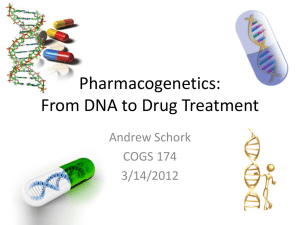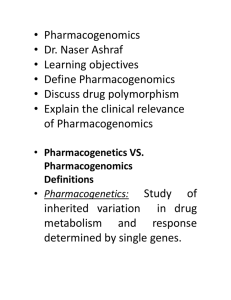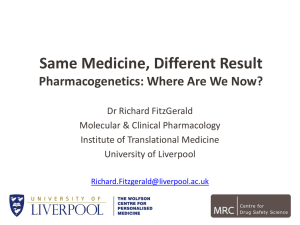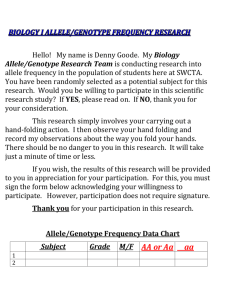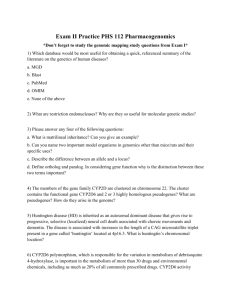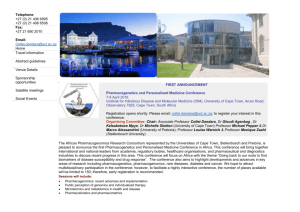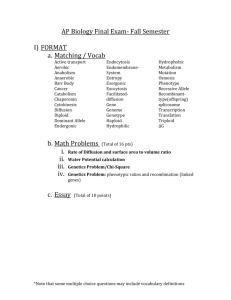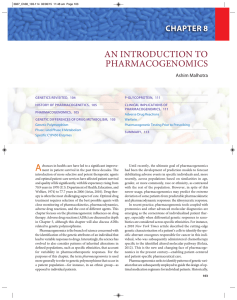Supplementary references: 1 Kitagawa, K., Kunugita, N., Kitagawa
advertisement
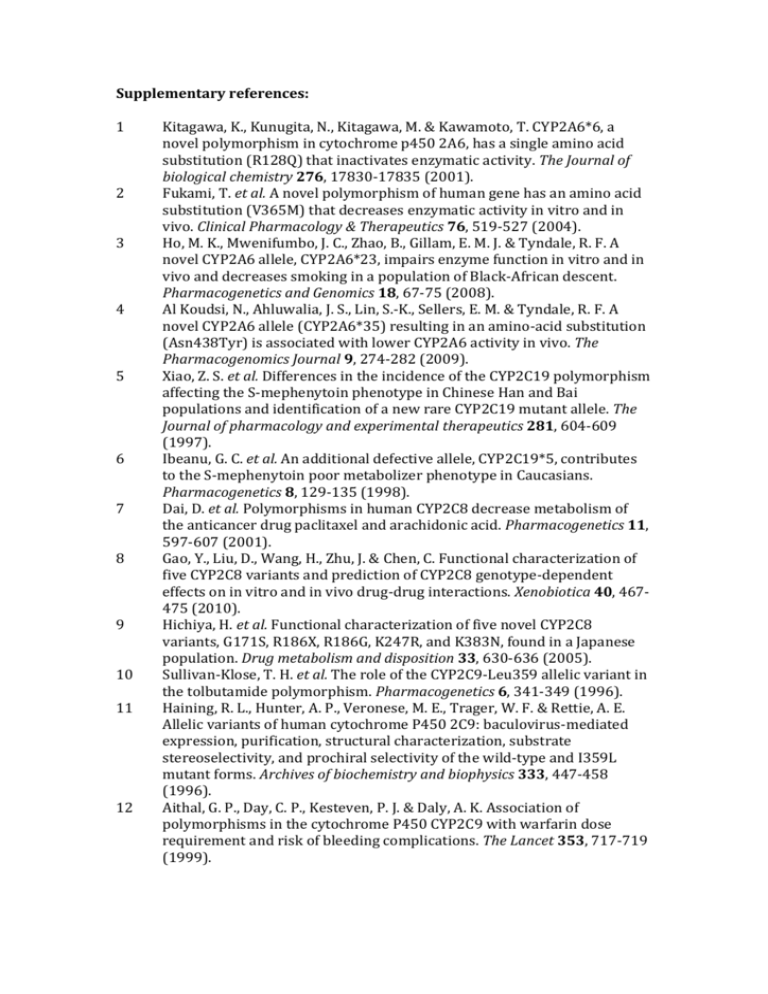
Supplementary references: 1 2 3 4 5 6 7 8 9 10 11 12 Kitagawa, K., Kunugita, N., Kitagawa, M. & Kawamoto, T. CYP2A6*6, a novel polymorphism in cytochrome p450 2A6, has a single amino acid substitution (R128Q) that inactivates enzymatic activity. The Journal of biological chemistry 276, 17830-17835 (2001). Fukami, T. et al. A novel polymorphism of human gene has an amino acid substitution (V365M) that decreases enzymatic activity in vitro and in vivo. Clinical Pharmacology & Therapeutics 76, 519-527 (2004). Ho, M. K., Mwenifumbo, J. C., Zhao, B., Gillam, E. M. J. & Tyndale, R. F. A novel CYP2A6 allele, CYP2A6*23, impairs enzyme function in vitro and in vivo and decreases smoking in a population of Black-African descent. Pharmacogenetics and Genomics 18, 67-75 (2008). Al Koudsi, N., Ahluwalia, J. S., Lin, S.-K., Sellers, E. M. & Tyndale, R. F. A novel CYP2A6 allele (CYP2A6*35) resulting in an amino-acid substitution (Asn438Tyr) is associated with lower CYP2A6 activity in vivo. The Pharmacogenomics Journal 9, 274-282 (2009). Xiao, Z. S. et al. Differences in the incidence of the CYP2C19 polymorphism affecting the S-mephenytoin phenotype in Chinese Han and Bai populations and identification of a new rare CYP2C19 mutant allele. The Journal of pharmacology and experimental therapeutics 281, 604-609 (1997). Ibeanu, G. C. et al. An additional defective allele, CYP2C19*5, contributes to the S-mephenytoin poor metabolizer phenotype in Caucasians. Pharmacogenetics 8, 129-135 (1998). Dai, D. et al. Polymorphisms in human CYP2C8 decrease metabolism of the anticancer drug paclitaxel and arachidonic acid. Pharmacogenetics 11, 597-607 (2001). Gao, Y., Liu, D., Wang, H., Zhu, J. & Chen, C. Functional characterization of five CYP2C8 variants and prediction of CYP2C8 genotype-dependent effects on in vitro and in vivo drug-drug interactions. Xenobiotica 40, 467475 (2010). Hichiya, H. et al. Functional characterization of five novel CYP2C8 variants, G171S, R186X, R186G, K247R, and K383N, found in a Japanese population. Drug metabolism and disposition 33, 630-636 (2005). Sullivan-Klose, T. H. et al. The role of the CYP2C9-Leu359 allelic variant in the tolbutamide polymorphism. Pharmacogenetics 6, 341-349 (1996). Haining, R. L., Hunter, A. P., Veronese, M. E., Trager, W. F. & Rettie, A. E. Allelic variants of human cytochrome P450 2C9: baculovirus-mediated expression, purification, structural characterization, substrate stereoselectivity, and prochiral selectivity of the wild-type and I359L mutant forms. Archives of biochemistry and biophysics 333, 447-458 (1996). Aithal, G. P., Day, C. P., Kesteven, P. J. & Daly, A. K. Association of polymorphisms in the cytochrome P450 CYP2C9 with warfarin dose requirement and risk of bleeding complications. The Lancet 353, 717-719 (1999). 13 14 15 16 17 18 19 20 21 22 23 24 25 26 27 28 29 Kidd, R. S. et al. Pharmacokinetics of chlorpheniramine, phenytoin, glipizide and nifedipine in an individual homozygous for the CYP2C9*3 allele. Pharmacogenetics 9, 71-80 (1999). Takanashi, K. et al. CYP2C9 Ile359 and Leu359 variants: enzyme kinetic study with seven substrates. Pharmacogenetics 10, 95-104 (2000). Shintani, M. et al. Genetic polymorphisms and functional characterization of the 5'-flanking region of the human CYP2C9 gene: in vitro and in vivo studies. Clinical pharmacology and therapeutics 70, 175-182 (2001). King, B. P., Khan, T. I., Aithal, G. P., Kamali, F. & Daly, A. K. Upstream and coding region CYP2C9 polymorphisms: correlation with warfarin dose and metabolism. Pharmacogenetics 14, 813-822 (2004). Zhao, F. et al. Novel CYP2C9 genetic variants in Asian subjects and their influence on maintenance warfarin dose. Clinical pharmacology and therapeutics 76, 210-219 (2004). DeLozier, T. C., Lee, S.-C., Coulter, S. J., Goh, B. C. & Goldstein, J. A. Functional characterization of novel allelic variants of CYP2C9 recently discovered in southeast Asians. The Journal of pharmacology and experimental therapeutics 315, 1085-1090 (2005). Higashi, M. K. et al. Association between CYP2C9 genetic variants and anticoagulation-related outcomes during warfarin therapy. JAMA 287, 1690-1698 (2002). Blaisdell, J. et al. Discovery of new potentially defective alleles of human CYP2C9. Pharmacogenetics 14, 527-537 (2004). Allabi, A. C., Gala, J.-L. & Horsmans, Y. CYP2C9, CYP2C19, ABCB1 (MDR1) genetic polymorphisms and phenytoin metabolism in a Black Beninese population. Pharmacogenetics and Genomics 15, 779-786 (2005). Si, D. et al. Identification of a novel variant CYP2C9 allele in Chinese. Pharmacogenetics 14, 465-469 (2004). Guo, Y. et al. Catalytic activities of human cytochrome P450 2C9*1, 2C9*3 and 2C9*13. Xenobiotica 35, 853-861 (2005). Guo, Y. et al. Role of CYP2C9 and its variants (CYP2C9*3 and CYP2C9*13) in the metabolism of lornoxicam in humans. Drug metabolism and disposition 33, 749-753 (2005). Evert, B., Griese, E. U. & Eichelbaum, M. A missense mutation in exon 6 of the CYP2D6 gene leading to a histidine 324 to proline exchange is associated with the poor metabolizer phenotype of sparteine. NaunynSchmiedeberg's archives of pharmacology 350, 434-439 (1994). Marez, D. et al. An additional allelic variant of the CYP2D6 gene causing impaired metabolism of sparteine. Human genetics 97, 668-670 (1996). Wang, S. L., Lai, M. D. & Huang, J. D. G169R mutation diminishes the metabolic activity of CYP2D6 in Chinese. Drug metabolism and disposition 27, 385-388 (1999). Sakuyama, K. et al. Functional characterization of 17 CYP2D6 allelic variants (CYP2D6.2, 10, 14A-B, 18, 27, 36, 39, 47-51, 53-55, and 57). Drug metabolism and disposition 36, 2460-2467 (2008). Ji, L. et al. Single-step assays to analyze CYP2D6 gene polymorphisms in Asians: allele frequencies and a novel *14B allele in mainland Chinese. Clinical chemistry 48, 983-988 (2002). 30 31 Stec, D. E., Roman, R. J., Flasch, A. & Rieder, M. J. Functional polymorphism in human CYP4F2 decreases 20-HETE production. Physiological genomics 30, 74-81 (2007). Caldwell, M. D. et al. CYP4F2 genetic variant alters required warfarin dose. Blood 111, 4106-4112 (2008).
